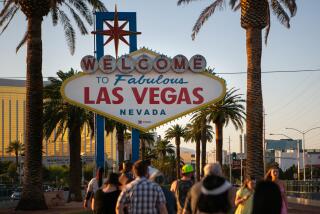Iowa caucuses are opening act for GOP presidential race
After months of campaigning and a revolving cast of Republican front-runners, the Iowa caucuses on Tuesday night will provide the first voter verdict of the 2012 presidential contest.
President Obama’s victory on the Democratic side is a foregone conclusion. His campaign is already on the scene in Iowa, a battleground state in the fall. And without a challenger for the nomination, Obama has the luxury of focusing on what is shaping up as a tough general election.
Not so for the seven candidates for the GOP nomination. They have no time to pause before their next showdown, the New Hampshire primary, a week from now. If Romney were to score back-to-back wins in the first two contests — something no non-incumbent Republican presidential candidate has ever accomplished -- he’d become a heavy favorite to gain the nomination.
Romney, Rep. Ron Paul and Rick Santorum were closely bunched in the final pre-caucus polling in Iowa. Attempting to break into the top tier were Newt Gingrich, Gov. Rick Perry and Rep. Michele Bachmann.
At his final rally Tuesday morning, Romney turned his attention to Obama rather than his Republican rivals.
As he is fond of doing, Romney recalled the president’s prediction, in a TV interview during his first months in office, that if he didn’t turn the economy around, he’d be looking at a “one-term proposition.”
“I’m here to collect,” Romney told the audience at the Temple for Performing Arts. “He’s out!”
Paul, the iconoclastic congressman from the Houston area, was never far from the lead in Iowa. The 76-year-old Texan admitted that he was probably hurt by the fact that the caucus-night weather turned out cold but clear. He was considered among the best organized candidates, with a base of dedicated supporters who propelled him to a close second in the Ames straw poll and could be counted on to turn out even in the worst conditions.
Paul has been running for president, off and on, for a quarter of a century. His libertarian streak and appeal to tea party voters, who often call him their godfather for his long, often lonely fight against federal spending, helped him attract new supporters this time.
Santorum, more than any other Republican, followed the classic Iowa playbook — spending months visiting all 99 counties and talking to anyone who would listen.
The former Pennsylvania senator held more than 370 town-hall-style question-and-answer sessions with voters, from one that attracted a single voter to a number that drew hundreds of supporters in the closing days of the campaign. Helped by his antiabortion views, he gained endorsements from several prominent social conservatives, including Bob Vander Plaats, a former GOP gubernatorial candidate, and a prominent pastor and a talk-show host in western Iowa, the most conservative part of the state.
Iowa’s role, historically, has been to winnow the field. Already, Tim Pawlenty, the former governor of neighboring Minnesota, abandoned his presidential chase after a poor finish in the Ames straw poll in August.
That straw vote, an early organizing challenge in the Hawkeye State, helped send Mike Huckabee, a favorite of social and religious conservatives, to a caucus victory four Januaries ago. But Bachmann, the winner of the 2011 straw vote, has seen her candidacy fade. Since 1979, no GOP candidate who won the summertime straw poll ever finished worse than second in the caucuses the following winter.
Perhaps the earliest favorite, Bachmann, was quickly overtaken by Perry. The Texan helped diminish her straw-vote triumph by making his own splash the same day, when he announced his candidacy in South Carolina.
Perry’s ability to raise big money, and his reputation as the longest-serving governor in Texas, made him a formidable challenger — at least on paper. But his performance failed to live up to that promise.
Unlike past elections, when in-person campaigning in the early states often helped voters sort through the field of candidates, a series of much-watched TV debates filled that role this time. The highly publicized encounters helped deflate Perry’s prospects, after a series of faltering performances under the television lights.
That allowed a surprise contender — Herman Cain, a former businessman and talk show host from Atlanta — to parlay a compelling speaking style into a rapid rise in the polls. He was helped by his ability to articulate perhaps the most eye-catching idea of the Republican campaign — a “9-9-9” tax overhaul, which would replace the current system with sharply lower rates on income taxes for corporations and individuals and create a new national sales tax.
But like Perry, the inexperienced Cain faltered after exhibiting a shaky grasp of some of the facts and policies that voters expect a president to know. Early last month, after allegations of sexual harassment and a longtime extramarital affair surfaced, Cain dropped his try for the nomination.
Gingrich, the former House speaker whose early organizational and fundraising problems had virtually eliminated him from consideration, became the next Republican to leap into the top spot in the polls. But he was unable to survive a battering from his rivals and their allies, who poured millions into attack ads on TV and radio in Iowa that were designed to remind voters of Gingrich’s “baggage.”
Among the targets were a $300,000 payment that he made to settle ethics charges when he was speaker; a more recent $1.6-million consulting contract with Freddie Mac, the mortgage giant that many conservatives blame for the 2008 financial crisis; and a TV commercial about fighting climate change that he made with Democrat Nancy Pelosi.
Gingrich, unable to effectively counter the attacks, began to slide almost as quickly as he had risen. That left an opening for the last Iowa contender — Santorum — to mount a late surge.
Jon Huntsman, another Republican candidate who has attracted national attention, decided to skip Iowa and put his efforts almost exclusively into New Hampshire. Polling there shows him a distant third or fourth behind Romney, who owns a vacation home in the state and governed next-door Massachusetts.
More to Read
Start your day right
Sign up for Essential California for news, features and recommendations from the L.A. Times and beyond in your inbox six days a week.
You may occasionally receive promotional content from the Los Angeles Times.






